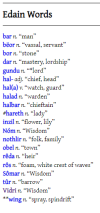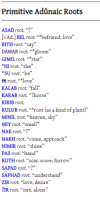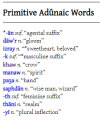So, in the Episode 1 script, the language of the humans (particularly the Haladin) comes up in contrast to the Sindarin that the Elves are speaking with them.
We could probably come up with a few phrases in this language, if we tried, but we would have to be willing to be rather...flexible with what Tolkien has given us. The easiest place to start is probably with Adûnaic, and then focus on the root words Tolkien had (ie, primitive Adûnaic), which would be roughly equivalent to the language of the House of Hador. For the House of Haleth, we have very, very little information on their language. Obviously, it's different from the House of Bëor and the House of Hador, but....aside from saying that "obel" means "town," and "hal-" likely means "leader," it's not like we know a lot about it.
According to the Eldamo website, these 30 words are all "Edainic":
View attachment 5329
So, 30 words, and 10% of them mean "wisdom"

Not a super promising beginning....
And here's the primitive Adûnaic root words:
View attachment 5330
...and the wordlist
View attachment 5331
Whether "Taliska" is meant to be the language of the House of Bëor or the House of Haleth seems somewhat unclear to me. As in, at one point in the history, they were one people, so it was one and the same language, but as time went on, the Haladin became more and more distinctive as their own group, and thus had their own language. But, should the Taliska grammar be published at any point, I would be happy to let Silm Film use that for any 1st Age Mannish languages we might need!
In the meantime....I guess we have the Dunlending word "Forgoil" for "Strawheads", so Handir could call Glorfindel "forgo" if we wanted him to, maybe? Not exactly a lot to go on, here.
So for now, what we have to work with is basically Adûnaic. Here's the Ardalambion article on it as a starting point:




